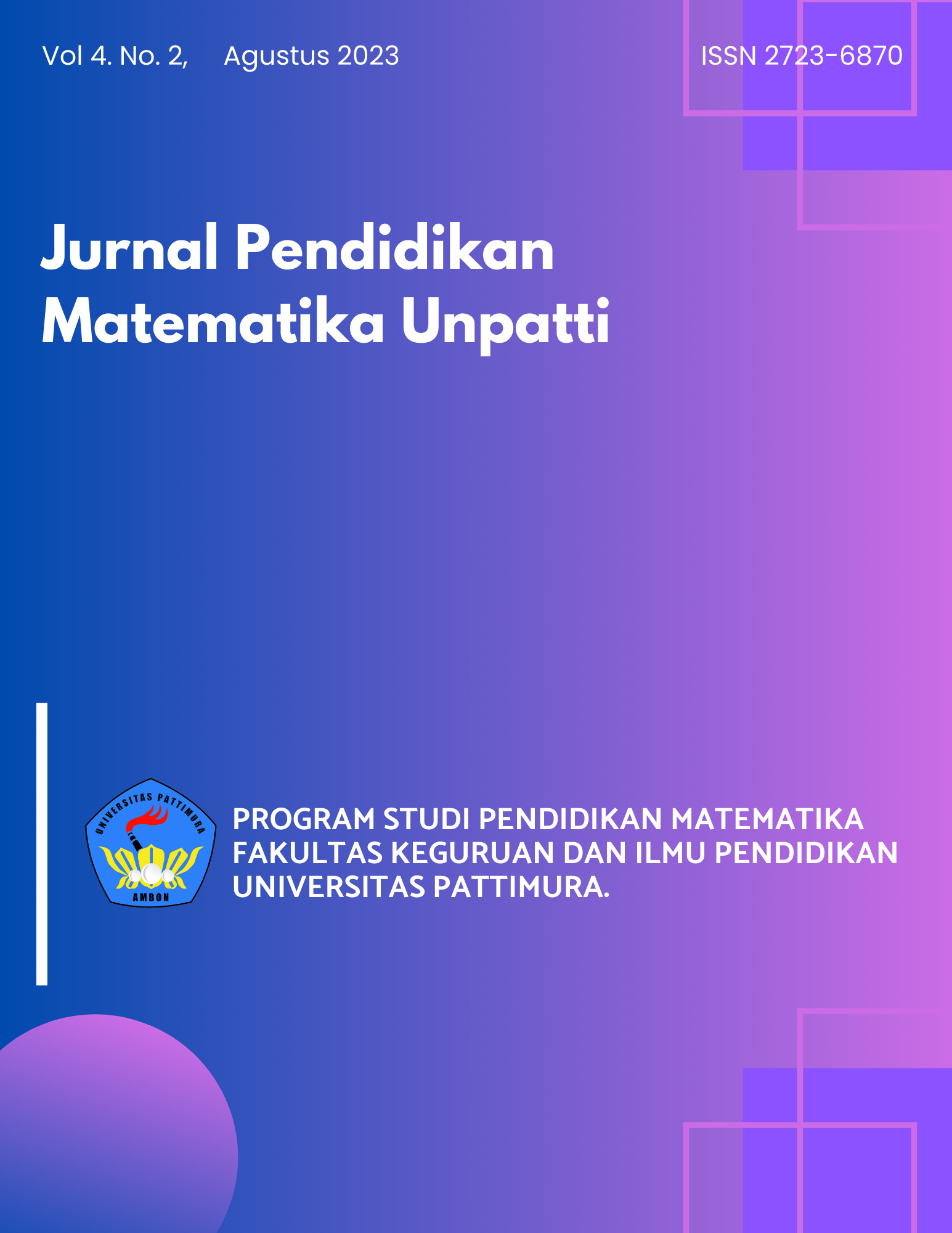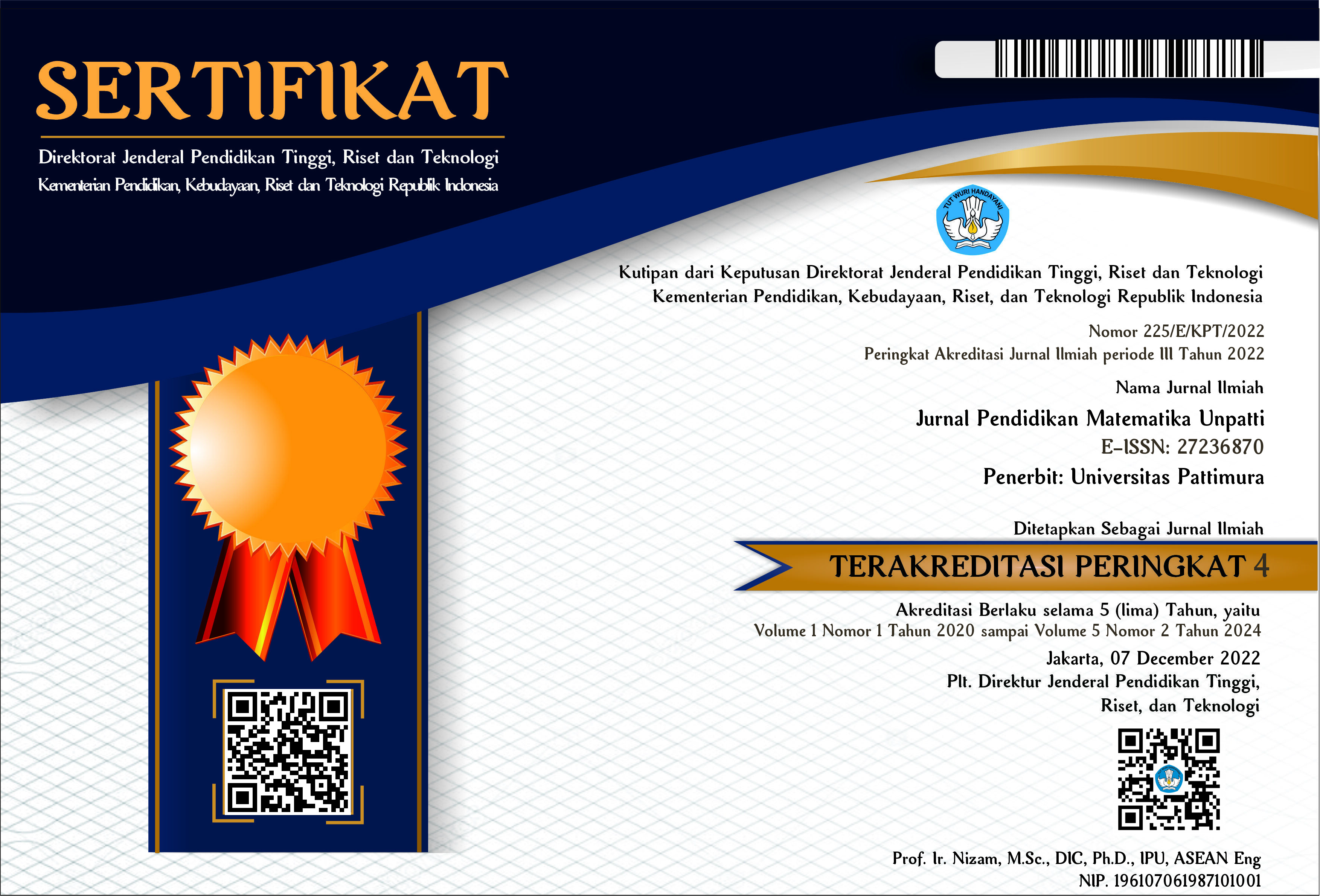ANALISIS KEMAMPUAN LITERASI MATEMATIKA BERDASARKAN PADA ASPEK NORMA SOSIOMATEMATIK
Abstract
This research aims to investigate the literacy abilities of students based on sociomathematics norms. The research method used is a case study. The subjects of this research consist of 3 selected students categorized as high, medium, and low achievers. The research incorporates a questionnaire, a written test, and interviews to assess the students' mathematical literacy abilities and their understanding of sociomathematics norms. The analytical technique employed includes the Rasch model for the questionnaire and test data, while the interview results were analyzed through reduction analysis, data gathering, and conclusions were facilitated using the MAXQDA application. The findings of the research indicate the following: 1) Students in the high category of mathematics literacy abilities also demonstrate high sociomathematics norms, and the same trend applies to the medium and lower categories; 2) The indicators of students' mathematics literacy abilities predominantly fall within levels 1, 2, and 4; 3) The indicators of sociomathematics norms among students primarily encompass mathematics experience, mathematics differences, and the effectiveness of mathematics. This research serves as a reference for readers seeking insights into the topic
Downloads
References
Daftar Pustaka
Agusta, I. (2003). Teknik Pengumpulan dan Analisis Data Kualitatif. Pusat Penelitian Sosial Ekonomi. Litbang Pertanian, Bogor, 27, 02(1), 59.
Arwadi, F., Alimuddin, & Rabani, M. H. (2022). Analisis Norma Sosiomatematik dalam Pembelajaran Matematika. Journal of Indonesian Teachers for Social Science and Humanities, 1(2), 33–42.
Bachri, B. S. (2010). Meyakinkan Validitas Data Melalui Triangulasi Pada Penelitian Kualitatif. Teknologi Pendidikan, 10, 46–62.
Diana, E., & Rofiki, M. (2020). Analisis Metode Pembelajaran Efektif Di Era New Normal. Jurnal Review Pendidikan Dan Pengajaran, 3(2), 336–342. https://doi.org/10.31004/jrpp.v3i2.1356
Duskri, M., Kumaidi, K., & Suryanto, S. (2014). Pengembangan Tes Diagnostik Kesulitan Belajar Matematika Di Sd. Jurnal Penelitian Dan Evaluasi Pendidikan, 18(1), 44–56. https://doi.org/10.21831/pep.v18i1.2123
Fatchurrohman, M., Mulyono, M., & Rosyida, I. (2022). Peran Motivasi Belajar Terhadap Literasi Matematika pada Peserta Didik Kelas VII. JNPM (Jurnal Nasional Pendidikan Matematika), 6(2), 342. https://doi.org/10.33603/jnpm.v6i2.6275
Hidayat, R., Roza, Y., & Murni, A. (2019). Peran Penerapan Model Problem Based Learning (PBL) terhadap Kemampuan Literasi Matematis dan Kemandirian Belajar. JURING (Journal for Research in Mathematics Learning), 1(3), 213. https://doi.org/10.24014/juring.v1i3.5359
John W. Creswell. (1989). STUDI KASUS ( John W . Creswell ) Oleh Yani Kusmarni. 1–12.
kadir. (2008). Mengembangkan Norma Sosiomatematik (Sociomathematical Norms) Dengan Memanfaatkan Potensi Lokal Dalam Pembelajaran Matematika. Pythagoras : Jurnal Pendidikan Matematika, 4(1), 74–85. https://doi.org/10.21831/pg.v4i1.689
Kafifah, A., Sugiarti, T., & Oktavianingtyas, E. (2018). MENYELESAIKAN SOAL PISA KONTEN Mahasiswa S-1 Prodi Pendidikan Matematika FKIP Universitas Jember. Jurnal Matematika Dan Pendidikan Matematika, 9(3). http://jurnal.unej.ac.id/index.php/kadikma/article/view/10918%0Ahttps://jurnal.unej.ac.id/index.php/kadikma/article/view/10918/6694
Kusumawardani, D. R., Wardono, & Kartono. (2018). Pentingnya Penalaran Matematika dalam Meningkatkan Kemampuan Literasi Matematika. PRISMA, Prosiding Seminar Nasional Matematika, 1(1), 588–595.
Maarif, S., Oktarina, N., Sessu, S., Sulistyowati, F., & Utami, W. B. (2022). Sociomathematical norms in online learning in the COVID-19 pandemic period. International Journal of Evaluation and Research in Education (IJERE), 11(4), 1673. https://doi.org/10.11591/ijere.v11i4.23046
Mansur, N. (2018). Melatih Literasi Matematika Siswa dengan Soal PISA. Prisma, 1, 140–144.
Mottier Lopez, L., & Allal, L. (2007). Sociomathematical norms and the regulation of problem solving in classroom microcultures. International Journal of Educational Research, 46(5), 252–265. https://doi.org/10.1016/j.ijer.2007.10.005
Muzaki, A., & Masjudin, M. (2019). Analisis Kemampuan Literasi Matematis Siswa. Mosharafa: Jurnal Pendidikan Matematika, 8(3), 493–502. https://doi.org/10.31980/mosharafa.v8i3.557
Ningsih, E. F. (2022). Membangun empati di era eksponensial melalui norma sosiomatematika. Jurnal Pembangunan Pendidikan: Fondasi Dan Aplikasi, 10(1), 62–74. https://doi.org/10.21831/jppfa.v10i1.29357
Ojose, B. (2011). Mathematics literacy : are we able to put the mathematics we learn into everyday use? Journal of Mathematics Education, 4(1), 89–100.
Perdana, S. A. (2018). Analisis Kualitas Instrumen Pengukuran Pemahaman Konsep Persamaan Kuadrat Melalui Teori Tes Klasik Dan Rasch Model. Jurnal Kiprah, 6(1), 41–48. https://doi.org/10.31629/kiprah.v6i1.574
Purwanti, A. F., Mutrofin, & Alfarisi, R. (2012). Analisis Literasi Matematika Ditinjau dari Kecerdasan Matematis-Logis Siswa. Jurnal Ilmu Pendidikan Sekolah Dasar, 1(2), 131–142.
Rizkianto, I. (2013). Norma Sosiomatematik Dalam Kelas Matematika. Prosiding Seminar Nasional Matematika Dan Pendidikan Matematika, November, 978–979.
S.A Widodo. (2015). Indentifikasi Kemampuan Literasi Matemtaika Siswa Kelas XIA- 4 SMA Negeri 1 Ambulu.
Sari, NovitaHera, R. (2015). Literasi Matematika: Apa, Mengapa dan Bagaimana? 713–720.
Sulfikawati, D., Suharto, S., & Kurniati, D. (2016). Analisis Norma Sosiomatematik dalam Pembelajaran Kolaboratif Pokok Bahasan Segitiga dan Segiempat di Kelas VII-C SMP Negeri 11 Jember. Jurnal Edukasi, 3(3), 1. https://doi.org/10.19184/jukasi.v3i3.3513
ULusiana, R. (2017). Analisis Kesalahan Mahasiswa Dalam Memecahkan Masalah Pada Materi Himpunan Ditinjau Dari Gaya Kognitif. Jurnal Penelitian Dan Pembelajaran Matematika, 10(1), 24–29. https://doi.org/10.30870/jppm.v10i1.1290
Utari, R. S. (2017). Implementasi Nilai-Nilai Karakter dan Norma Sosiomatematik dalam Pembelajaran Matematika. Prosiding Seminar Nasional 20 Program Pascasarjana Universitas PGRI Palembang, November. https://www.kemdikbud.go.id/main/blog/2017/01/men
WS, H., Taufina, Chandra, & Anita, Y. (2018). Literasi Matematis Dalam Pembelajaran Berbasis Masalah. Jurnal Pendidikan, 1(1), 167.
Copyright (c) 2023 Ayu Budi Cahayani Budi Cahayani, Samsul Maarif

This work is licensed under a Creative Commons Attribution 4.0 International License.
Jurnal Pendidikan Matematika Unpatti is an Open Access Journal. The authors who publish the manuscript in Jurnal Pendidikan Matematika Unpatti agree to the following terms:
Jurnal Pendidikan Matematika Unpatti is licensed under a Creative Commons Attribution 4.0 International . This permits anyone to copy, redistribute, remix, transmit and adapt the work provided the original work and source is appropriately cited.
This means:
(1) Under the CC-BY license, authors retain ownership of the copyright for their article, but authors grant others permission to use the content of publications in Jurnal Pendidikan Matematika Unpatti in whole or in part provided that the original work is properly cited. Users (redistributors) of Jurnal Pendidikan Matematika Unpatti are required to cite the original source, including the author's names, Jurnal Pendidikan Matematika Unpatti as the initial source of publication, year of publication, volume number, issue, and Digital Object Identifier (DOI); (2) Authors grant Jurnal Pendidikan Matematika Unpatti the right of first publication. Although authors remain the copyright owner.





